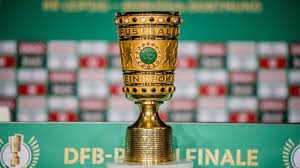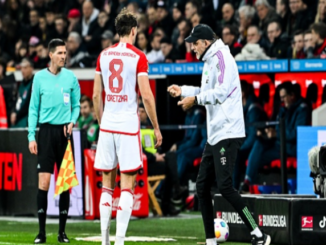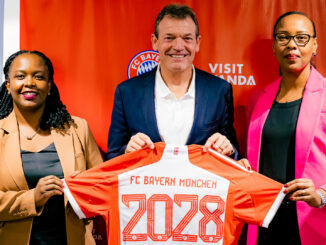
TSV Vestenbergsgreuth 1-0 Bayern Munich, Frankenstadion, 14 August 1994
A blend of tea and football
The tiny Franconian village of Vestenbergsgreuth is known for two things; tea and football. It is the home of the Martin Bauer Group, a large multinational tea business, and it is the home of TSV Vestenbergsgreuth, a tiny club who created one of the greatest shocks in DFB-Pokal history, with a famous first-round win over Bayern Munich.
TSV Vestenbergsgreuth was only founded in 1974, a few months before Bayern won the European Cup for the first time. Higher-ups in the Martin Bauer business were among the first members, giving the club the nickname, the ‘Teekickers’. The Teekickers had already achieved four promotions by 1984 when Helmut Hack – grandson of Martin Bauer – became the new club chairman. Under his leadership they thrived further, establishing themselves in the third tier Bayernliga. In 1994, they became a part of the new Regionalliga Süd, and they qualified for the DFB-Pokal. There they would meet Bayern Munich.
Bayern’s national humiliation
Bayern had already lost once in the first round in 1990, beaten 1-0 by FV Weinheim, an Oberliga side. But the game with Vestenbergsgreuth is unquestionably more famous, more celebrated – probably because the shock win was shown live on ZDF, one of Germany’s top TV channels, with over 7 million people watching.
Did the TV schedulers know they were in for a surprise? Bayern’s record in the cup had been dismal ever since their last triumph in 1986. After the loss to Weinheim in 1990, Bayern went out to Homburg in the second round in 1991 – having received a bye in the first round. In 1993 they finally made it further, then lost to Dynamo Dresden in the Round of 16.
Bayern attracted the viewers. The champions had a new coach, European Cup winner Giovanni Trapattoni, a new star striker in Ballon d’Or winner Jean-Pierre Papin, and the most expensive new goalkeeper ever, Oliver Kahn.
Their opponent’s goalkeeper was far less high-profile. First choice Günther Reichold injured himself in the warmup, so backup Ralf Scherbaum unexpectedly found himself thrust into the team. Like the rest of the team, Scherbaum was no professional. Young forward Roland Stein actually worked in a factory for the Martin Bauer tea company as a mechanic. Playing against names like Papin, Lothar Matthäus, Mehmet Scholl and recent World Cup winner Jorginho in Nürnberg’s famous Frankenstadion, where they would draw a crowd of nearly 25,000, it would be easy for die Greuther to be overawed.
Scherbaum wasn’t – he made a couple of saves early on. But the chances dried up, so forward came Vestenbergsgreuth. Just before half-time, the ball found Wolfgang Hüttner on the wing, sprinting to try and keep it in play. He cut it back first time towards the six-yard-box, where Roland Stein was running in. Oliver Kahn, squeezed against the post, left the cross alone. Stein headed it across the goal, and Kahn couldn’t get in the way. 1-0. Der Titan rarely looked so small.

The lower-league side, coached by ex-Bundesliga keeper Paul Hesselbach, almost doubled their lead early in the second half through Hüttner. Bayern came close too every now and then, but there was no onslaught. Their best chance came in injury time, when Papin had an effort cleared off the line. Then it was over – the tiny village team had beaten the mighty Bayern. The players embarked on a lap of honour around the Frankenstadion, as ZDF’s reporters conducted interviews with their coach, and the beaten captain Lothar Matthäus.

The cup run would continue with a 5-1 win over 2. Bundesliga side Homburg, before losing on penalties to eventual finalists VfL Wolfsburg. Ironically, Bayern Munich’s reserves made it one round further than die Greuther, achieving two big shocks of their own against Bremen and Stuttgart. They also beat Vestenbergsgreuth in the league just two weeks after the first team had failed.
The Greuthers go to Fürth
But soon the story of Vestenbergsgreuth would come to an end. In 1996, chairman Hack led them to merge with their much bigger but financially troubled neighbours SpVgg Fürth, who became Greuther Fürth. Hack became their president, and later became vice-president of the DFB. A number of players from the famous cup game including goalscorer Stein would go on to play for Fürth after the merger, and helped them win promotion to the 2. Bundesliga in 1997, coached by Armin Veh. The name of Vestenbergsgreuth would eventually make it to the Bundesliga when Fürth finally won promotion in 2012.
Two members of the Bayern-beating team went on to even bigger things. Harry Koch won the cup the following season after joining Kaiserslautern, then won the Bundesliga in 1998. His centre-back partner Frank Schmidt had a solid lower league career before returning to his hometown Heidenheim. In 2007, he became the coach of 1. FC Heidenheim, then in the Oberliga. Now Heidenheim are in the Bundesliga, and Schmidt will have at least two more chances to replicate what he and his teammates did nearly 30 years ago.
But even if they do, it won’t have the same legacy. Vestenbergsgreuth’s triumph tops nearly every list of the biggest German cup shocks. When the DFB installed a Pokal walk of fame at the Olympiastadion in 2013, Roland Stein was one of the first inductees. And to this day, the Greuther-Teeladen sells a fruit tea blend simply called “1-0”.
Vestenbergsgreuth – Scherbaum, Schmidt, Lunz, Koch, Santl, Weigl, Ebner, Wirsching, Stein, Pfeuffer, Hüttner – Subs: Latteier, Ernst – Coach: Hesselbach
Goals – Stein (43)
Bayern Munich – Kahn, Helmer, Babbel, Matthäus, Nerlinger, Hamann, Scholl, Jorginho, Sternkopf, Papin, Witeczek – Subs: Schupp, Valencia – Coach: Trapattoni
This article is part of a new series on Bundesliga Fanatic entitled German Football’s Greatest Games. Celebrating 120 years since the first ever German football championship and 60 years since the first Bundesliga season, we’ll be going back through the country’s footballing history and writing about some of the most important and most memorable games Germany has ever seen.
Click the tag ‘German Football’s Greatest Games’ to see all the entries in the series.



